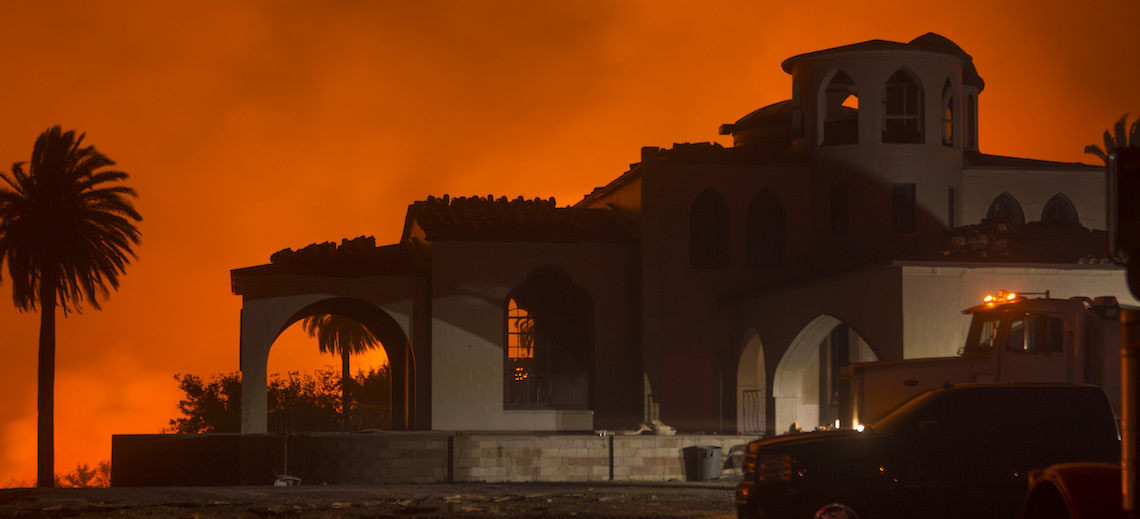
The Thomas Fire rages in Ventura County in this 2017 photo. Wildfire is one of the reasons why the largest insurers in the country are pulling away from new business in California. U.S. Forest Service photo
Written by Estela Anahi Jaramillo
Insurance agents are urging customers to grab hold of their current contracts and don’t let go as the future of insurance coverage in California grows hazy.
California’s infamous reputation for natural catastrophes has pushed the largest insurance companies in the nation to close their doors on new homeowner policies in the Golden State.
Top insurance companies State Farm and Allstate have both announced they are no longer offering homeowners insurance to California residents.
“It’s never happened in the insurance industry,” said Belen Sanchez, owner and broker of Belen Sanchez Insurance Agency Inc. in Fresno.
Sanchez graduated from Fresno State in 2002, where she then opened her own office under Farmers Insurance. At the start of her career in the industry, Sanchez explained how simple it was for her clients to get a home or auto insurance quote.

In 2017 she became a broker to help Fresno County residents find their best quote from any agency. In recent months, she said it has been challenging finding insurance providers that offered what her clients needed because of this past winter’s weather conditions.
“Now it seems like insurance companies are either deciding to stay just writing autos, or just writing homes, or they’re just completely getting out of California,” Sanchez said.
About half of all U.S. insurance underwriting business originates in California. The value of California real estate and inflationary pressure has also impacted insurers. Sanchez explained that the losses these companies experienced here left a significant impact on revenue.
“So before, it used to cost $100,000 to build a house, and now it costs $400,000,” Sanchez stated,
This issue resembles what is seen in the auto insurance industry, as mechanics begin to charge more for labor and prices for vehicle parts increase.
On May 26, State Farm announced they would no longer offer homeowners insurance. The decision was made based on several factors including the increase in construction costs, inflation, catastrophic exposure and the challenging reinsurance market — supplemental coverage purchased by other insurers — over the past couple of years.
“We take seriously our responsibility to manage risk,” State Farm said. “It’s necessary to take these actions now to improve the company’s financial strength.”
A few days later, Allstate dropped the hammer. The company announced it had actually stopped offering new homeowners, condo and commercial coverage in November 2022.
The insurance company clarified that despite ceasing to accept new applications, existing customers would not be affected by this decision.
“The cost to insure new home customers in California is far higher than the price they would pay for policies due to wildfires, higher costs for repairing homes, and higher reinsurance premiums,” according to Allstate.
Earlier this year, California Sen. Scott Wilk urged the insurance commissioner to act on skyrocketing property premiums and coverage drops.
“The reality is if you are a homeowner in California, you are SOL when it comes to property insurance. California’s natural disaster risk isn’t going anywhere — fires, earthquakes, floods — they are a fact of life. Insurance companies are doing what they need to do for their bottom line, which unfortunately leaves California property owners unable to get or afford insurance. There are no easy answers, and until recently, there was no legislative will to act. With the rural-urban interface growing, urban/suburban legislators now have some skin in the game and more interest in the topic. This, combined with the Insurance Commissioner’s involvement, gives me some hope that we can work with the industry to make sure our property owners are not left without insurance,” said Sen. Wilk (R-Santa Clarita) in an interview with The Business Journal.
More than 1.2 million homes in California are at risk for extreme wildfire, more than any other state. As of May of this year, CalFire has battled 1,205 wildland fires
This past winter, California faced a series of storms that caused flooding in multiple communities.
The Federal Emergency Management Agency was able to help homeowners who were hit hardest by the floods. As a result, the aid created a discussion about expanding flood zones.
Sanchez said some homeowners don’t realize that marking their communities as flood zones then requires insurance agencies to add another policy they cannot afford.
California’s residents are seeing a resemblance to what occurred in Florida after the state was hit by Hurricane Andrew, which devastated Miami in 1992. The effect of the hurricane bankrupted many insurers and caused most national agencies to pull out of the state.
As the agencies left, it allowed Florida to establish a market based on small insurance companies backed up by Citizens Property Insurance Corporation. This state-mandated company provided wind-storm coverage for those who couldn’t find private insurance.
California is seeing something similar with the California FAIR Access to Insurance Requirements Plan. These provide basic fire insurance coverage for properties in high-risk areas. Enrollment for this plan has jumped to 272,846 homes in 2022.
The FAIR plan only provides coverage for fire damage, so homeowners still must look for other policies such as water damage and theft.
“The Department of Insurance is focused on the safety of our homes and communities. We have been here before after major wildfires. What’s different is the actions that we are taking with the first-ever insurance discount program for wildfire safety and unprecedented wildfire mitigation investments from the Legislature and Governor,” the California Department of Insurance said in a statement on State Farm’s announcement.
Another factor that has pushed out insurance agencies is Proposition 103.
Insurance companies requested to raise their prices but were continuously shut down by the state’s insurance regulator. In 1998 voters approved Proposition 103, which allowed the state insurance commissioner to reject proposed rate increases and order refunds. This kept rates artificially low for Californians.
State Farm and Allstate both had been seeking significant rate increases before they made their decision.
With insurance agencies’ requests being denied, this has resulted in homeowners being denied policies if they didn’t meet the criteria of the agency.
Sanchez explained that if a homeowner is near a high-risk wildfire site, an agency can deny them coverage so they don’t lose revenue.
A local insurance agent who requested to remain anonymous stated that many decisions were based on profitability. Private companies are not subsidized by the government, which drives most of the findings in these top companies.
“In California, auto insurance lost over $1 billion in 2022. There was no profitability in auto insurance. That is due to the rising price of cars and the labor to repair cars. That is coupled with the exponential increase in auto accidents,” the insurance agent said.
In 1995 companies stopped writing home insurance until the state removed earthquake coverage and covered that in their policies. Even now, agents like Sanchez have been told by agencies to stop promoting auto insurance to customers because of the significant loss in revenue.







